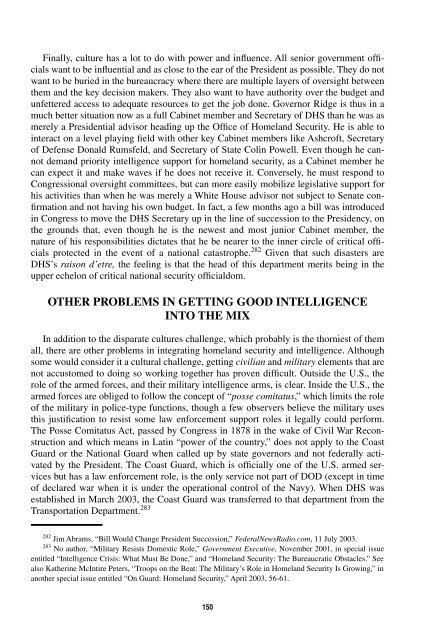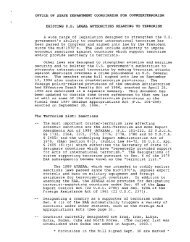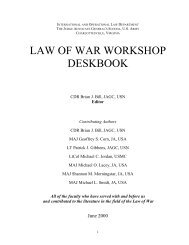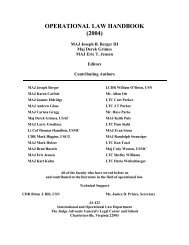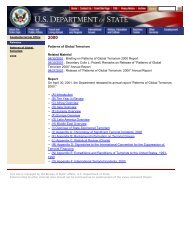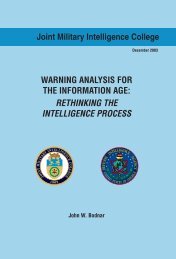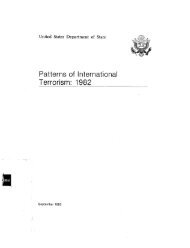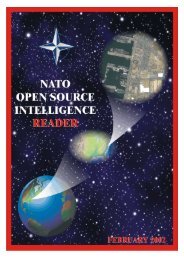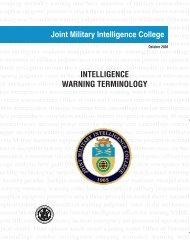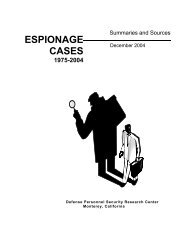learning with professionals - Higgins Counterterrorism Research ...
learning with professionals - Higgins Counterterrorism Research ...
learning with professionals - Higgins Counterterrorism Research ...
Create successful ePaper yourself
Turn your PDF publications into a flip-book with our unique Google optimized e-Paper software.
Finally, culture has a lot to do <strong>with</strong> power and influence. All senior government officials<br />
want to be influential and as close to the ear of the President as possible. They do not<br />
want to be buried in the bureaucracy where there are multiple layers of oversight between<br />
them and the key decision makers. They also want to have authority over the budget and<br />
unfettered access to adequate resources to get the job done. Governor Ridge is thus in a<br />
much better situation now as a full Cabinet member and Secretary of DHS than he was as<br />
merely a Presidential advisor heading up the Office of Homeland Security. He is able to<br />
interact on a level playing field <strong>with</strong> other key Cabinet members like Ashcroft, Secretary<br />
of Defense Donald Rumsfeld, and Secretary of State Colin Powell. Even though he cannot<br />
demand priority intelligence support for homeland security, as a Cabinet member he<br />
can expect it and make waves if he does not receive it. Conversely, he must respond to<br />
Congressional oversight committees, but can more easily mobilize legislative support for<br />
his activities than when he was merely a White House advisor not subject to Senate confirmation<br />
and not having his own budget. In fact, a few months ago a bill was introduced<br />
in Congress to move the DHS Secretary up in the line of succession to the Presidency, on<br />
the grounds that, even though he is the newest and most junior Cabinet member, the<br />
nature of his responsibilities dictates that he be nearer to the inner circle of critical officials<br />
protected in the event of a national catastrophe. 282 Given that such disasters are<br />
DHS’s raison d’etre, the feeling is that the head of this department merits being in the<br />
upper echelon of critical national security officialdom.<br />
OTHER PROBLEMS IN GETTING GOOD INTELLIGENCE<br />
INTO THE MIX<br />
In addition to the disparate cultures challenge, which probably is the thorniest of them<br />
all, there are other problems in integrating homeland security and intelligence. Although<br />
some would consider it a cultural challenge, getting civilian and military elements that are<br />
not accustomed to doing so working together has proven difficult. Outside the U.S., the<br />
role of the armed forces, and their military intelligence arms, is clear. Inside the U.S., the<br />
armed forces are obliged to follow the concept of “posse comitatus,” which limits the role<br />
of the military in police-type functions, though a few observers believe the military uses<br />
this justification to resist some law enforcement support roles it legally could perform.<br />
The Posse Comitatus Act, passed by Congress in 1878 in the wake of Civil War Reconstruction<br />
and which means in Latin “power of the country,” does not apply to the Coast<br />
Guard or the National Guard when called up by state governors and not federally activated<br />
by the President. The Coast Guard, which is officially one of the U.S. armed services<br />
but has a law enforcement role, is the only service not part of DOD (except in time<br />
of declared war when it is under the operational control of the Navy). When DHS was<br />
established in March 2003, the Coast Guard was transferred to that department from the<br />
Transportation Department. 283<br />
282 Jim Abrams, “Bill Would Change President Succession,” FederalNewsRadio.com, 11 July 2003.<br />
283 No author, “Military Resists Domestic Role,” Government Executive, November 2001, in special issue<br />
entitled “Intelligence Crisis: What Must Be Done,” and “Homeland Security: The Bureaucratic Obstacles.” See<br />
also Katherine McIntire Peters, “Troops on the Beat: The Military’s Role in Homeland Security Is Growing,” in<br />
another special issue entitled “On Guard: Homeland Security,” April 2003, 56-61.<br />
150


